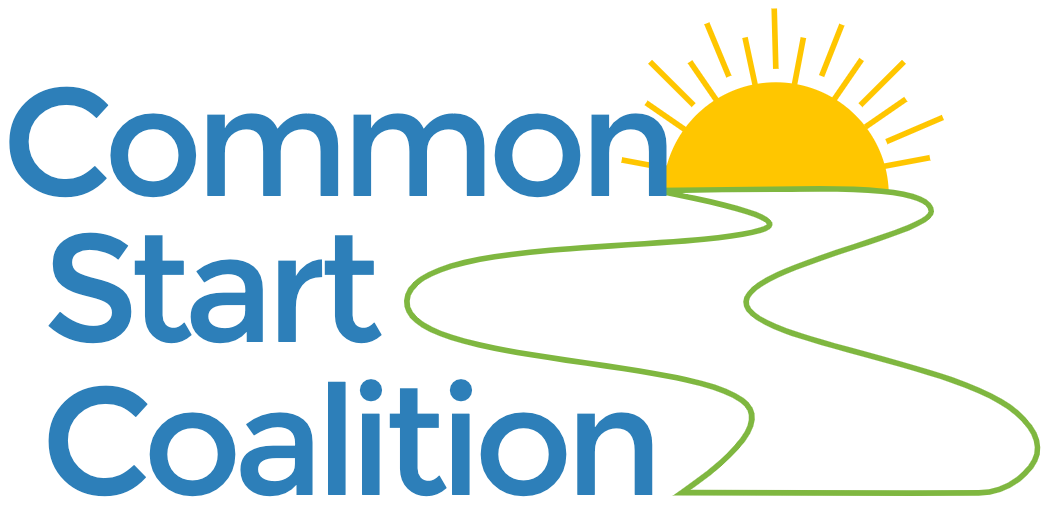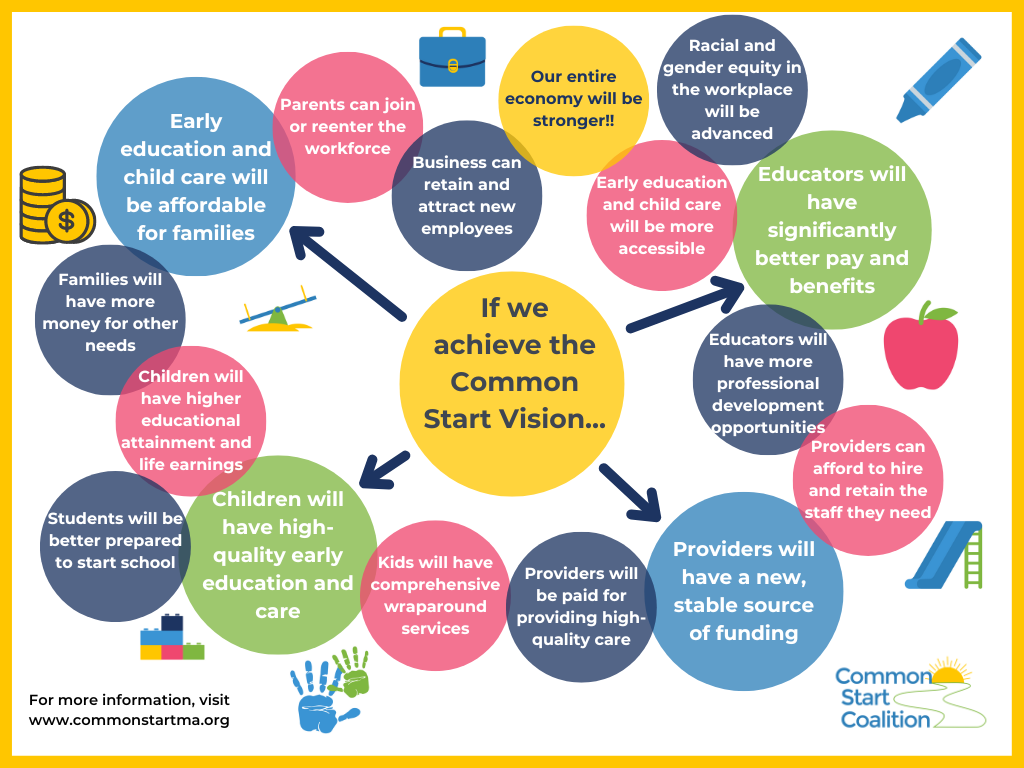
The Common Start Plan
MA Families Need Affordable, High-Quality Early Education and Child Care
In order to provide children with an equal start in life, strengthen our economy in a way that also reduces racial, gender, and income inequality in our state, and meet the needs of working parents and the 21st century workforce; Massachusetts families need affordable, accessible, high-quality early education and child care.
Massachusetts needs urgent action to address the multifaceted child care crisis. Tens of thousands of parents and caregivers in Massachusetts – mostly women – have left the workforce due to the lack of affordable child care, and most families with young children struggle to keep up with the high cost of care. Many early education and child care providers already have closed their doors, and others are on the verge of going out of business. Early childhood educators are leaving their jobs because of low pay; they can’t afford to work in the field they love. Employers across the state are suffering due to their employees’ struggles with child care. Last year, the state’s Legislative Early Education and Care Economic Review Commission found that immediate public funding is needed now, as well as in the long term, to ensure that providers can keep their programs open and pay wages sufficient to keep educators in their classrooms.
Failure to address the child care crisis now will take its toll on the next generation: when denied access to high-quality early education and child care, vulnerable children miss out on the learning environments, structure, and stability that help set them up for education success, optimal earnings, and long-term health and wellbeing. Ensuring that all children have access to high quality early education and care is how we prevent achievement gaps from widening and health disparities from worsening.
During the immediate recovery from the pandemic and over the long term, access to affordable, high-quality early education and child care is critical to building a stronger, more equal and just Massachusetts. The Common Start Coalition is committed to making this vision a reality.
Legislation That Advances the Common Start Agenda
H.489 (Reps. Madaro & Gordon) & S.301 (Sens. Lewis & Moran)
Legislators in the Massachusetts House and Senate have introduced bills that would advance the Common Start agenda this year. The Common Start legislative framework, reflected in both bills, would provide the specific structure that is needed to deliver affordable care options for families; significantly better pay and benefits for early educators; a new, stable source of funding for providers; high-quality programs and services for children; and substantial relief for businesses and our economy. Fulfilling our full vision will require a sustained effort to fund this framework and build on it over the course of several years.
Under the bills, programs would be available in early education and child care centers, private homes, and schools – the same settings where early education and child care is provided now. The bills affect early education and care for children from birth through age 5, as well as after- and out-of-school time for children ages 5-12, and for children with special needs through age 15 – in line with the ages covered by the current child care subsidy system.
The Common Start legislative framework uses a combination of direct-to-provider operational funding and family financial assistance to reduce costs to families while compensating providers for the true cost of providing quality care.
Operational Funding: The bills would permanently establish a direct-to-provider funding allocation based on provider capacity (not attendance) that directly offsets provider operating costs, including higher educator pay – similar to the Commonwealth Cares for Children (C3) program.
Family Financial Assistance: The bills would provide financial assistance to enable more families to afford and access high-quality early education. They prioritize families earning at or below 85% of state median income ($115,546 for a family of 4, or $78,571 for a family of 2) and, as funding becomes available, would extend eligibility for financial assistance to middle-income families.
What Does This Mean For…
Families:
Financial assistance to the majority of families to significantly lower the cost of care
Enhanced earning opportunities, financial security, and long-term wellbeing
Children:
Participation in high-quality early education and care programs
Greater access to wraparound services
Increased education attainment and life-time earnings and longer-term health benefits, including improvements to children’s brain development
Providers:
Increased public investments in providers to help meet true cost of providing high-quality care
Direct-to-provider operational funding provides stable source of funding and promotes delivery of higher quality care
Educators:
Higher salaries and expanded professional development opportunities
Support for higher credential/degree attainment
Businesses:
Critical support to labor pool
Benefits talent recruitment, retention, and productivity

Get Involved
Massachusetts families need affordable, high-quality early education and child care now! If you're a parent, an early educator, a provider, an employer, or an advocate — we need your voice. Sign up here to join our movement!
Learn more about the Common Start legislative plan with the resources below.
Current Resources
View a fact sheet on the Common Start 2023 agenda (view in Spanish or Portuguese)
View a fact sheet on H.489 (Reps. Madaro & Gordon) (view in Spanish, Brazilian Portuguese, or European Portuguese)
View a fact sheet on S.301 (Sens. Lewis & Moran) (view in Spanish, Brazilian Portuguese, or European Portuguese)
Track the progress of H.489, see the bill’s co-sponsors, and read the full bill text
Track the progress of S.301, see the bill’s co-sponsors, and read the full bill text
View an infographic about the Common Start vision (view in Spanish)
View a guide to writing a letter to the editor about the Common Start vision
See a list of Common Start coalition members
If you have additional questions about the Common Start legislation, please contact info@commonstartma.org
Resources from the 2021-2022 Legislative Session
View a fact sheet recapping Common Start’s work during the 2021-2022 legislative session
View a fact sheet on H.4795/S.2883 and the Common Start agenda
View a Spanish-language fact sheet on H.4795/S.2883 and the Common Start agenda
View a Portuguese-language fact sheet on H.4795/S.2883 and the Common Start agenda
View a detailed fact sheet on H.4795/S.2883 and how it compares to the original Common Start bill
View a fact sheet on the original Common Start bill (view a fact sheet in Spanish)
View the full text of the original Common Start bill
View a summary overview of the original Common Start bill
View a legal section-by-section summary of the original Common Start bill
View a general list of Frequently Asked Questions (FAQs) about the original Common Start bill
View a short list of FAQs for early education and child care providers
View a detailed list of FAQs for early education and child care providers

